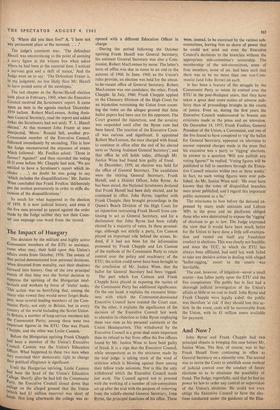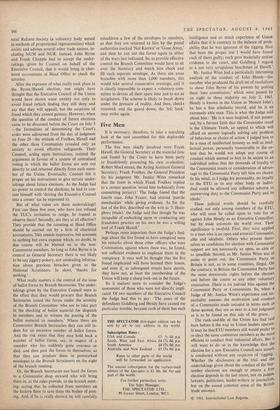And Now ?
John Byrne and Frank Chapple had two principal objects in bringing this case before Mr. Justice Winn. The first, of course, was to bar Frank Haxell from continuing in office as General Secretary on a minority vote. The second was to invite the Court to establish some method of judicial control over the conduct of future elections so as to eliminate the possibility of fraud. The Judge, regretfully, said that he had no power by law to order any control or supervision of the Union's elections. He could not even oblige the Executive Council to have the elec- tions conducted under the guidance of the Elec- toral Reform Society (a voluntary body versed in methods of proportional representation) which assists and advises several other trade unions, in- cluding NUM and NUR. Instead, John Byrne and Frank Chapple had to accept the under- takings, given by Counsel on behalf of the Executive Council, that it would bring in char- tered accountants at Head Office to check the scrutiny.
After the exposure of what really took place in the Byrne/Haxell election, one might have thought that the Executive Council of the Union would have shown some anxiety not only to avoid fraud (which finding they still deny and say that they will appeal), but the suspicion of fraud which they cannot gainsay. However, when the question of the conduct of future elections came to be discussed before the Court on July 3 —the formalities of determining the Court's order were adjourned from the day of judgment on June 28—the attitude of Foulkes, Haxell and the other three Communists revealed only an anxiety to avoid effective safeguards. Their Counsel, acting upon instructions, resisted the arguments in favour of a system of centralised voting in which the ballot forms are sent out directly to and returned directly from each mem- ber of the Union. Eventually, Counsel felt it proper on his instructions to give certain under- takings about future elections. As the Judge had no power to control the elections, he had Ao con- tent himself with 'driving the Executive Counsel into a corner' (as he expressed it).
But of what value are these undertakings? First can these five men, who have just refused the TUC's invitation to resign, be trusted to observe them? Secondly, are they at all effective? They provide that the counting at Head Office should be carried out by a firm of chartered accountants. This sounds impressive, but amounts to nothing but extra expense which, no doubt, in due course will be blamed on to the non- Communist members. So long as John Byrne is in control as General Secretary there is not likely to be any jiggery-pokery, nor misleading informa- tion about previous breaches given to the National Scrutineers. In short, 'thanks for nothing.'
What really matters is the control of the issue of ballot forms by Branch Secretaries. The under- takings given by the Executive Council were to the effect that they would procure that Branch Secretaries issued the forms under the scrutiny of the Branch Committee 'who are to take part in the checking of ballot material for dispatch to members and to witness the posting of the ballot material to members.' Where there are Communist Branch Secretaries they can still in- dent for an excessive number of ballot forms. And the risk exists that they may hold back a number of ballot forms, say, in respect of a member who has suddenly gone overseas or died, and then post the forms to themselves, so that they can produce them in postmarked envelopes to the Branch Scrutineers on the night of the branch meeting.
Or, the Branch Secretaries can hand the forms to a Communist shop steward who will bring them in, as the rules provide, to the branch meet- ing, saying that he collected from members on the factory floor to save them the bother of post- ing. And, if he is really shrewd, he will carefully misaddress a few of the envelopes to members, so that they are returned to him by the postal authorities marked 'Not Known' or 'Gone Away,' and then he can use the forms again in either of the ways just indicated. So, to provide effective control the Branch Committee would have to sit over the Secretary and watch him check and fill each separate envelope. As there are some branches with more than 1,000 members, this would take several consecutive evenings; and it is clearly impossible to expect a voluntary com- mittee to devote all their spare time just to act as invigilators. The scheme is likely to break down under the pressure of reality. And then, checks removed, and the guard down, the 'left hook' may strike again.



































 Previous page
Previous page